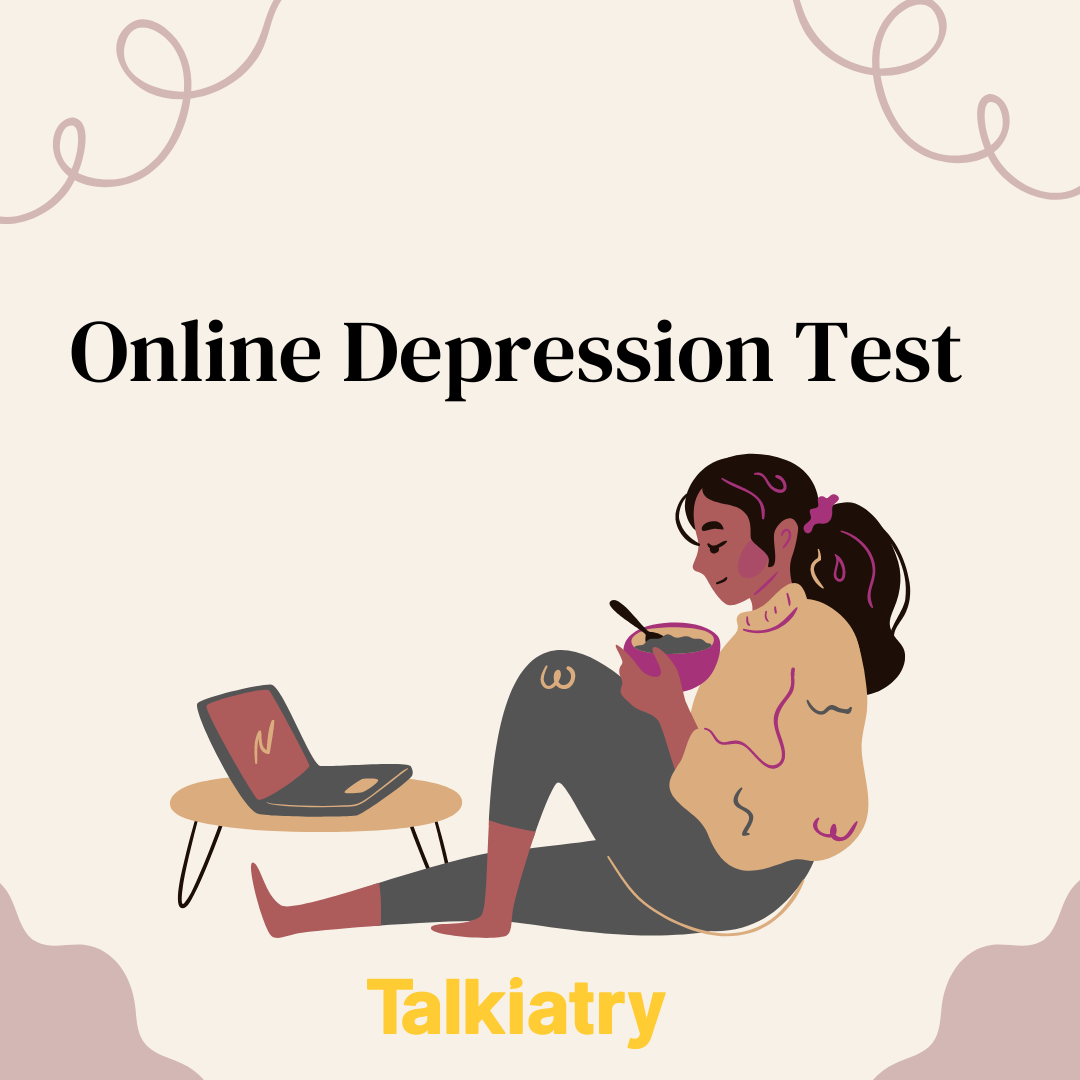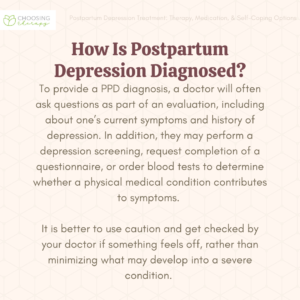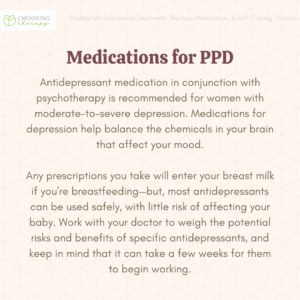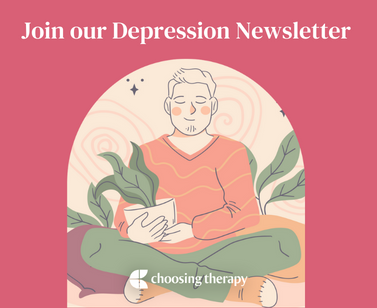New parents can experience a subset of depression known as postpartum depression (PPD), which can negatively affect how they feel, think, and act. PPD can cause sadness, and a loss of interest in activities once enjoyed. Fortunately, it is also treatable utilizing a combination of therapy, medication, and healthy coping mechanisms.1
Depression Is Treatable With Therapy Would you like to feel more happiness and joy? BetterHelp has over 20,000 licensed therapists who provide convenient and affordable online therapy. BetterHelp starts at $65 per week. Take a Free Online Assessment and get matched with the right therapist for you.
What Is Postpartum Depression?
Postpartum depression, now termed peripartum depression by the DSM-V, is one of the most common complications experienced by parents following the birth of a baby. Postpartum depression doesn’t just affect first-time parents; it can also impact those with multiple children even if they have not experienced the condition before.2,3,4
The symptoms of PPD are most commonly felt during the first three weeks after delivery, but can also be persistent, lasting longer than a year. A person with PPD might feel hopeless, sad, and guilty, because they may not be able to bond with or care for their baby. After a birth, many parents experience bouts of sadness, but if these feelings worsen or persist beyond two weeks, you may be experiencing postpartum depression. Additionally, symptoms can further develop into a major depressive disorder if left untreated.2
Parents who have experienced depression before pregnancy, feel unprepared for parenting, or are dealing with unemployment/financial difficulties are at higher risk for developing postpartum depression. Men can also experience PPD, including new fathers with a personal or family history of depression. Struggling with work-life balance, problems with communication, and division of labor in the family can all exacerbate the transition into parenthood.4,5,6
Common symptoms of postpartum depression may include:
- Depressed mood or severe mood swings
- Excessive crying
- Difficulty bonding with your baby
- Withdrawing from family and friends
- Loss of appetite or eating much more than usual
- Inability to sleep (insomnia) or sleeping too much
- Intense irritability and anger
- Fear that you’re not a good parent
- Hopelessness
- Thoughts of harming yourself or your baby
- Thoughts of death or suicide
Is It Postpartum Depression or Baby Blues?
Many parents experience low moods or even sadness for a few days following birth, which can be attributed to hormonal changes and are entirely normal. About 80% of women experience baby blues, starting within the first two or three days after birth and lasting for up to two weeks.
Symptoms that last longer than a couple of weeks–including thoughts or plans of hurting yourself or the baby, hallucinations, or other symptoms of psychosis–should be brought to your doctor immediately. Baby blues usually resolve independently of further treatment.3
Signs of baby blues may include the following:
- Mood swings
- Crying episodes
- Anxiety
- Sadness
- Feeling overwhelmed or irritable
- Difficulty sleeping and eating
- Difficulty concentrating
How Is Postpartum Depression Diagnosed?
Ultimately, it is better to use caution and get checked by your doctor if something feels off, rather than minimizing what may develop into a severe condition. To provide a PPD diagnosis, a doctor will often ask questions as part of an evaluation, including about one’s current symptoms and history of depression. In addition, they may perform a depression screening, request completion of a questionnaire, or order blood tests to determine whether a physical medical condition contributes to symptoms.
Postpartum Depression Treatment Options
Standard postpartum depression treatment options include therapy, medications, and educational/support groups. However, psychotherapy is considered to be the first-line treatment option for parents with peripartum depression.
Therapy
It may help to discuss your concerns with a psychiatrist, psychologist, or other mental health professional. You can find better ways to cope with your feelings, solve problems, set realistic goals, and respond to situations positively through therapy. Sometimes family or relationship therapy also helps to support the dynamics in the family and the new parents.5,6 Additionally, if you’re struggling with stress; adjustment to parenting; Baby Blues; pregnancy; postpartum depression; or anxiety, support and educational groups may be available in your community.
Therapy options for postpartum depression may include:
- Cognitive behavioral therapy (CBT): CBT is an effective treatment for depression, and is used to treat a wide range of other mental health conditions. It’s often the preferred type of psychotherapy, because it generally requires fewer sessions than other types of therapy.7
- Individual therapy: Individual therapy allows you to talk one-on-one with your own therapist, and provides a safe place to express yourself without judgment.
- Family therapy: Family therapy can be helpful for all members to express how they’re feeling about a given situation.
Medications
Antidepressant medication (pharmacological treatment) in conjunction with psychotherapy is recommended for women with moderate-to-severe depression. Your doctor may suggest an antidepressant to help manage and minimize your symptoms of depression.
Medications for depression help balance the chemicals in your brain that affect your mood. Any prescriptions you take will enter your breast milk if you’re breastfeeding; but, most antidepressants can be used safely, with little risk of affecting your baby. Work with your doctor to weigh the potential risks and benefits of specific antidepressants, and keep in mind that it can take a few weeks for them to begin working.5,9,10
Medications for treating postpartum depression include:
SSRIs
Some of the preferred antidepressants include the category known as selective serotonin reuptake inhibitors (SSRIs). These are often a popular choice from providers, due to their low risk of side effects, limited effect on breastfeeding, and effectiveness in improving symptoms.
Common SSRIs include:
- Celexa (citalopram)*
- Lexapro (escitalopram)*
- Luvox (fluvoxamine)*
- Paxil (paroxetine)*
- Prozac (fluoxetine)*
- Zoloft (sertraline)*
*This medication has a black box warning, the most serious kind of warning from the FDA for a risk of suicidal thoughts and behaviors in certain people. You should talk with your doctor about these risks before starting this medication.
SNRIs
Serotonin and norepinephrine reuptake inhibitors (SNRIs) are a class of medications that are effective in treating depression. Typically the benefits of antidepressants outweigh the possible side effects. Which antidepressant is best depends on several issues, such as your symptoms and other health conditions.
Common SSRIs include:
- Desvenlafaxine (Pristiq)*
- Duloxetine (Cymbalta)*
- Levomilnacipran (Fetzima)*
- Venlafaxine (Effexor XR)*
*This medication has a black box warning, the most serious kind of warning from the FDA for a risk of suicidal thoughts and behaviors in certain people. You should talk with your doctor about these risks before starting this medication.
Benzodiazepines
While antidepressants are the optimum medication choice for PPD, some doctors will also prescribe benzodiazepines. These rapid acting anti-anxiety medications are often used while waiting for an SSRI to take effect. Since tolerance can develop with the use of these drugs, please make sure to talk to your prescriber about long-term use.1
Common benzodiazepines include:
- Valium (diazepam)**
- Ativan (lorazepam)**
- Xanax (alprazolam)**
- Ativan (lorazepam)**
- Klonopin (clonazepam)**
**This medication has black box warnings, the most serious kind of warnings from the FDA for abuse or misuse, risk of physical dependence and risk of serious side effects, including death, when combined with an opioid.
Other Postpartum Depression Medications
Other medications are now being developed as options for treating postpartum depression, with two recently FDA-approved medications being released in the past few years. Zulresso is taken as an infusion, and Zurzuvae is a fast-action treatment taken as a once-daily capsule. These new treatments offer additional options for those seeking relief from postpartum depression symptoms.
***These medications have black box warnings, the most serious kind of warning from the FDA. Brexanolone (Zulresso) carries a risk of extreme sedation and sudden loss of consciousness. Zuranolone (Zurzuvae) carries a risk of impairment when driving or engaging in other activities.
Hospitalization
Sometimes, therapy and medication may not help resolve PPD symptoms sufficiently. In these cases, it might be time to consider a more intensive line of treatment in the form of hospitalization. If you’re thinking about suicide, hurting yourself, or if you’re actively planning to end your life, it’s essential to seek immediate help. You can reach out to a suicide prevention hotline, or visit the emergency room for mental health support.
Treatment will vary between hospitals and patients–your doctor will generally work with you to find the best antidepressants or prescription for your symptoms. During a hospital stay–whether voluntary or involuntary–physicians might also offer alternative treatments such as repetitive transcranial magnetic stimulation (rTMS). This treatment may provide an attractive option for women who wish to continue breastfeeding, and are concerned about exposure to medication for their infant. In addition, If your provider detects severe postpartum depression while you’re still in the hospital, they may recommend IV medication containing brexanolone.(18)
Some doctors may also recommend electroconvulsive therapy (ECT). Modern ECT is highly controlled and very safe. This treatment is usually prescribed only when people do not respond to medication and talk therapy, or have treatment-resistant depression. Once you are discharged, your doctor or therapist will work with you to continue your treatment.9,8
Help For Depression BetterHelp – Get help from a licensed therapist. BetterHelp offers convenient and affordable online therapy starting at $65 per week. Free Assessment Talkspace – Online Therapy With Or Without Insurance. Talkspace accepts many insurance plans including Optum, Cigna, and Aetna. Typical co-pay is $30, but often less. Get started
Questions to Ask Your Doctor
New parents commonly expect to encounter big life changes when a new baby arrives. However, not everyone anticipates the mental health challenges that can come during pregnancy and after giving birth. Before your little one is born, consider reaching out to your doctor to learn more about the possibility of experiencing PPD, common symptoms, and the steps you can take to support yourself, your spouse, and other family members.
Some questions to ask your doctor about PPD treatment include:
- What changes can we expect in my mental health during pregnancy and after giving birth?
- What can I do if my loved one is dealing with postpartum depression?
- What are the risk factors/triggers for postpartum depression?
- What are the symptoms of postpartum depression?
- What do I need to tell my doctor?
- What are my treatment options for postpartum depression?
- What are the things I need to do to get well?
- Can you recommend some support groups for postpartum depression?
- Where else can I learn more about peripartum (postpartum) depression?
- How long does treatment usually last?
- Which therapy methods work best for busy parents and families?
Tips for Coping With Postpartum Depression
Healthy coping mechanisms can help you deal with peripartum depression symptoms. Becoming a parent triggers new emotional experiences–from joy and excitement, to anxiety and fear. Baby blues are relatively common among new moms, but using positive coping skills allows you to better manage long-lasting symptoms.
Here are five coping skills to help you manage symptoms of PPD:2,11
1. Build a Secure Bond With Your Baby
Many new parents need time to bond with their baby. Often, bonding occurs gradually over the baby’s first year of life. So, if you don’t feel close to your child in the first days or weeks after birth, that’s normal. Still, there are some steps you can take to help you bond with your newborn. Skin-to-skin contact and making eye contact can promote these bonds.
2. Maintain Self-Care
Take care of yourself by eating regularly, drinking water, and maintaining a healthy sleep routine. Remember to take a shower and get outside! Practicing self-care can also include grounding techniques, which are a critical component of managing anxiety or trauma symptoms. They can reduce immediate distress, and help promote calmness and self-regulation.
3. Try Exercising
There are numerous mental health benefits of exercise. Because of this, consider slowly reintroducing exercise after your doctor gives you the all-clear. Start small by going for a walk, or you can even resume your pre-pregnancy exercise routines.
4. Practice Mindfulness
Be mindful of the present moment instead of focusing on future worries. For example, yoga is a mindfulness practice that can help reduce anxiety symptoms, and benefit your body. Yoga can help with anxiety by encouraging you to slow down and focus on your breathing.
5. Seek Support
Build a support network, including parenting groups, friends, family, and health care professionals. Community resources, support groups, and parenting classes, also can help relieve stress. Online or in-person groups can help you connect with other parents, talk about your experience, and learn about helpful tools and resources.6,8,5
If you are struggling to pay for your basic needs, there are programs that can provide assistance.
How to Support Someone Experiencing Postpartum Depression
Pregnancy and postpartum mood and anxiety disorders affect the whole family. There is no magic cure, and sometimes recovery seems slow. Still, things will keep improving for your loved one with continued support and reassurance. When trying to help someone with PPD, it is important to approach them with gentleness and listen closely to what they ask of you because they may not have the energy to communicate their needs a second time.
Here are some ways you can support someone experiencing postpartum depression:
- Keep them well-fed: Do what you can to ensure your loved one eats regularly throughout the day, because low blood sugar often results in a low mood and frustration. Have healthy and easy snacks on hand.
- Listen to them: Do your best to listen for the actual request at the heart of their frustration. Reduce conflict by telling them, “I know we can work this out. I am listening.”
- Be open and communicative: Keep the lines of communication open. Verbalize your feelings, rather than bottle them up. It is helpful to take a break if your tempers are hot, but do be sure to maintain healthy contact.
- Be understanding: If your loved one is expressing anger, you might say something like, “I want to listen to you. I know this is important. But, I’m having a hard time because you’re so mad at me. Can we take a break and talk about it later?”
- Ask them how you can help: Ask your loved one what they feel they need from you. If they don’t know how you can help, make some suggestions.
- Reassure them: PPD is not their fault; they are not alone and they will get better.
- Encourage open expression: Please encourage them to talk about their feelings, and listen to them without judgment.
- Offer to help: As a partner of someone with PPD, help with housework before they ask you. Don’t expect them to complete household tasks, just because they are home.
- Encourage self-care: Please encourage them to take time for self-care. Breaks are necessary; fatigue is a major contributing factor to worsening symptoms.
- Promote social interaction: Help them reach out to others for support and treatment. Or, schedule some dates with them and work together to find a babysitter, so you and your partner can have some much needed social rejuvenation.
- Be caring and affectionate: If your spouse or partner is the one experiencing PPD, offer simple affection and physical comfort. But, be patient if they are not up for sex. It’s normal for them to have a low sex drive with depression; rest and recovery will help to bring it back.
Final Thoughts
Even though postpartum depression and its treatment can be challenging, help is available. Thankfully, perinatal mood and anxiety disorders can be temporary, and are treatable with support and professional help. Strive to eliminate any stigma regarding your or your loved one’s symptoms, because it can sometimes be difficult to ask for support. You don’t have to struggle with perinatal depression alone–reach out to your healthcare provider to start experiencing relief.
Additional Resources
To help our readers take the next step in their mental health journey, Choosing Therapy has partnered with leaders in mental health and wellness. Choosing Therapy is compensated for marketing by the companies included below.
Talk Therapy
Online-Therapy.com – Get support and guidance from a licensed therapist. Online-Therapy.com provides 45 minute weekly video sessions and unlimited text messaging with your therapist for only $64/week. Get Started
Online Psychiatry
Hims / Hers If you’re living with anxiety or depression, finding the right medication match may make all the difference. Connect with a licensed healthcare provider in just 12 – 48 hours. Explore FDA-approved treatment options and get free shipping, if prescribed. No insurance required. Get Started
Depression Newsletter
A free newsletter from Choosing Therapy for those impacted by depression. Get helpful tips and the latest information. Sign Up
Learn Anti-Stress & Relaxation Techniques
Mindfulness.com – Change your life by practicing mindfulness. In a few minutes a day, you can start developing mindfulness and meditation skills. Free Trial
Choosing Therapy Directory
You can search for therapists by specialty, experience, insurance, or price, and location. Find a therapist today.
For Further Reading
- Zurzuvae (Zuranolone): Uses, Side Effects, Dosage, & More
- The Postpartum Depression Workbook
- Zulresso Cost, Coupons, Copay, & Patient Assistance
- Zurzuvae (Zuranolone) Side Effects: Common Symptoms & What to Do About Them
- Zurzuvae (Zuranolone) Dosage Guide
- Zulresso (Brexanolone) Side Effects: Common, Serious, & Long Term
- How to Help Your Wife With Postpartum Depression
Online Depression Test A few questions from Talkiatry can help you understand your symptoms and give you a recommendation for what to do next. Best Online Psychiatry Services Online psychiatry, sometimes called telepsychiatry, platforms offer medication management by phone, video, or secure messaging for a variety of mental health conditions. In some cases, online psychiatry may be more affordable than seeing an in-person provider. Mental health treatment has expanded to include many online psychiatry and therapy services. With so many choices, it can feel overwhelming to find the one that is right for you.









